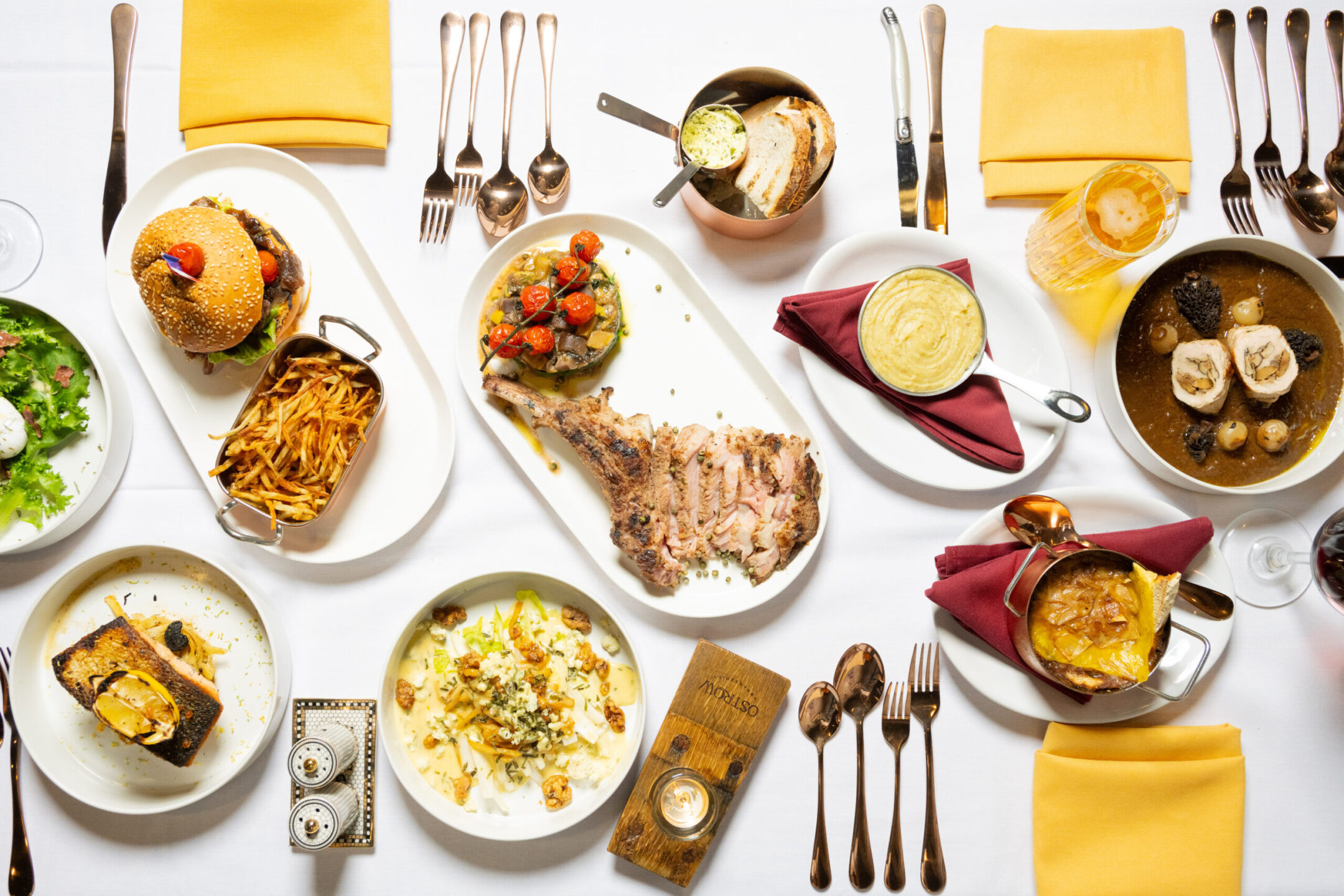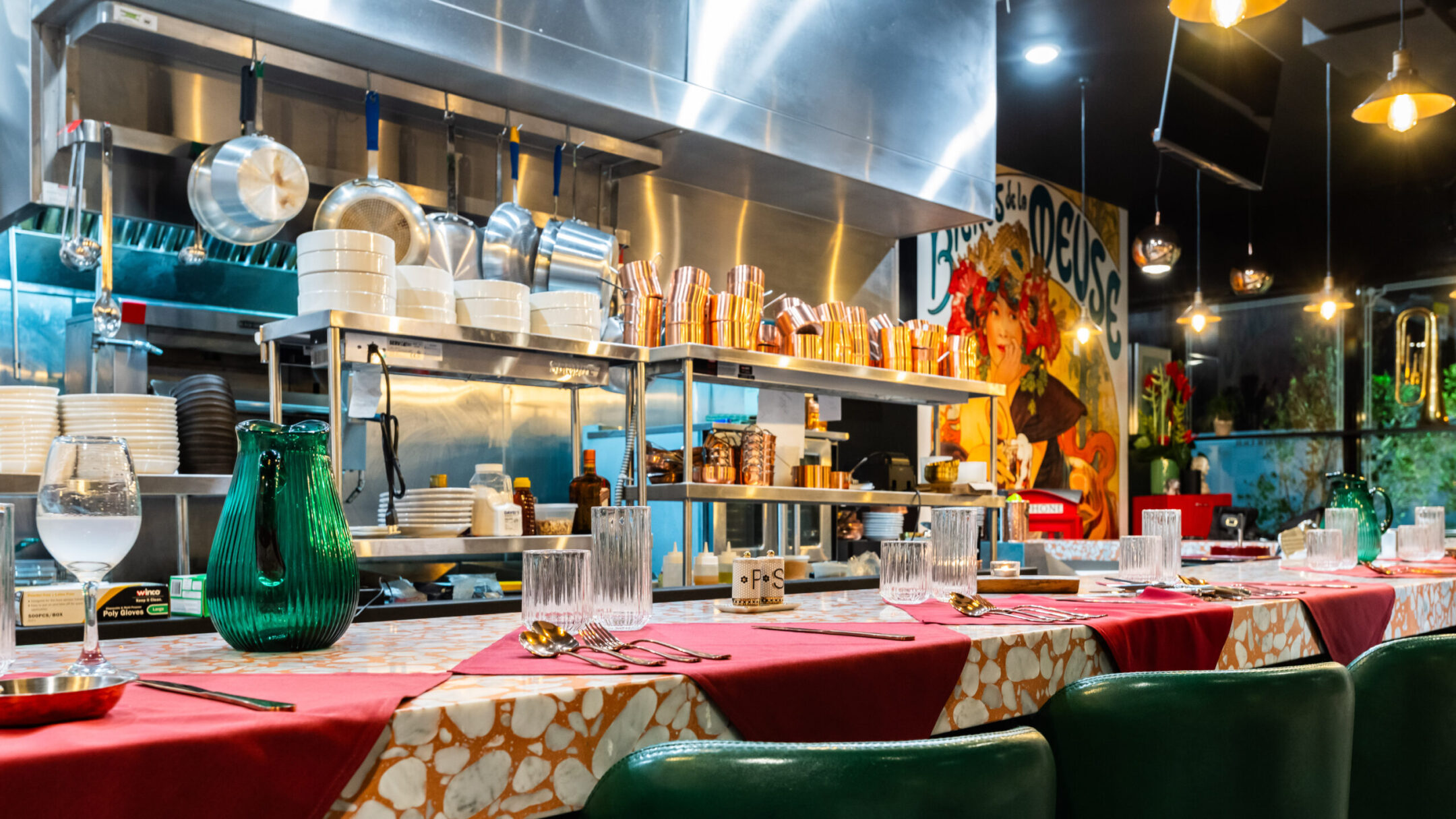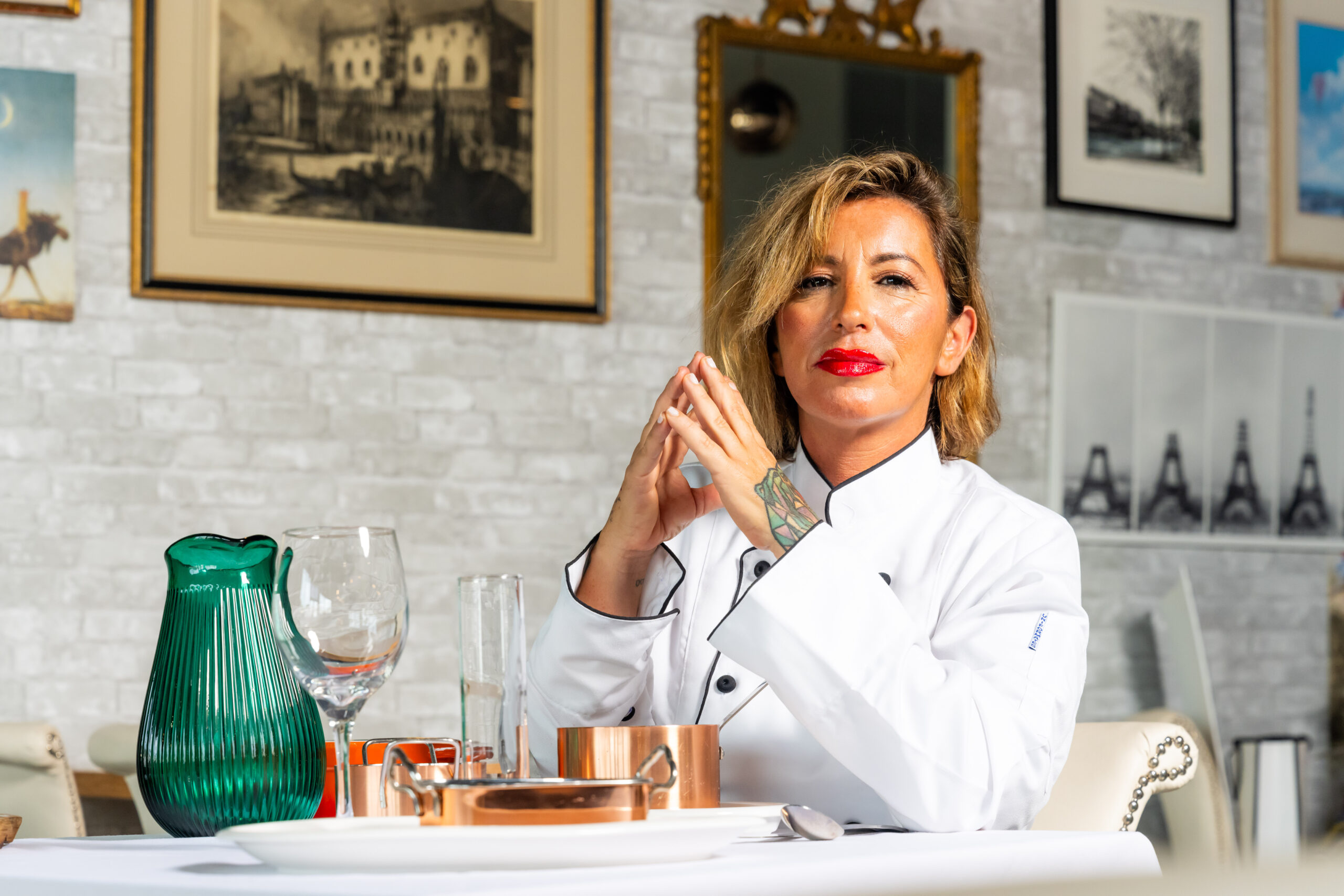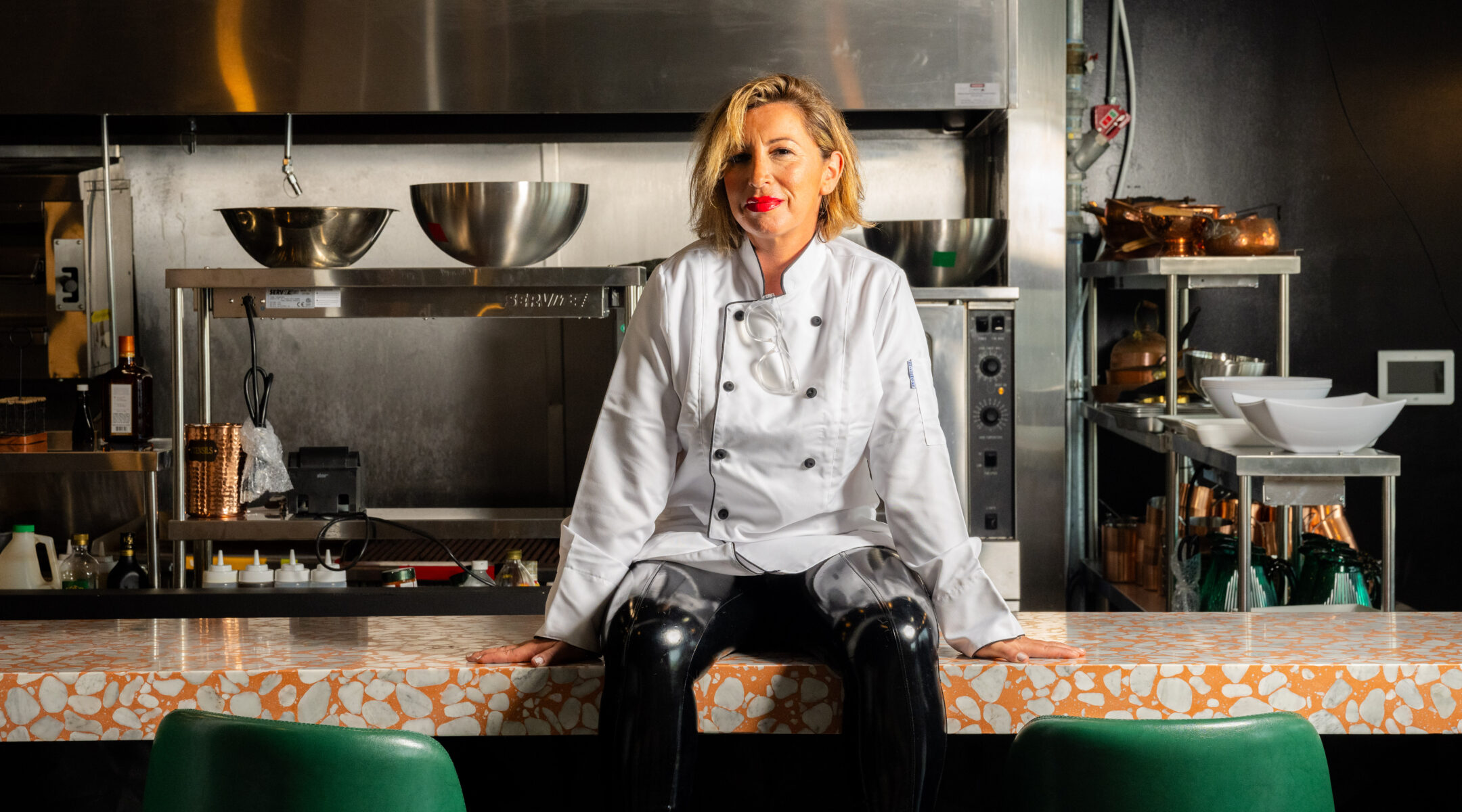MIAMI (JTA) — It’s Saturday night on a brisk Miami weekend and Ostrow Brasserie is packed with diners for its post-Shabbat dinner service.
Servers clad in crisp white shirts, black ties and suspenders weave through tables of guests that vary from black hat-clad Hasidic Jews to Israelis in sequined jackets to families of sunburned French tourists lucky to have snagged a 9:45 p.m. reservation during the busy season. Dishes of duck confit, beef Bourguignon and truffle and artichoke risotto with cognac sauce are expedited from the open kitchen, which flanks a dining room outfitted with cushy white chairs and painted brick walls festooned with a Belle Époque-style mural.
Presiding over this gastronomic gestalt is the petite powerhouse Olivia Ostrow. The Paris-born chef opened her eponymous restaurant in the summer of 2023 on a nondescript block in Miami’s Buena Vista neighborhood, far away from the touristy districts of South Beach and downtown, and even farther away from the typical kosher dining neighborhoods of Surfside and Aventura.
Yet despite its atypical location, the eatery, known for its reinterpretation of French classics with a kosher spin, has been an uncanny hit.
“The fact that I’m choosing to do authentic French kosher cuisine in the middle of nowhere in Miami is very much “on brand” for me,” explains Ostrow. “Meaning: chaotic, unique and always striving to be alone on my little island doing my own thing.”

The food at Ostrow Brasserie is “trayf good,” according to a Miami kosher restaurant blogger. (Courtesy Salar A – Miami Creative Agency)
The hospitality veteran, who often pairs her white chef’s jacket with black leather pants and red lipstick, has 30 years of experience in the industry. She has previously helmed restaurants in her native France and in North Carolina, worked for a time with prodigious restaurateur Stephen Starr in South Beach and served as the food and beverage director at the Savoy Hotel. She has also appeared on television and, in early 2020, was a contestant on Guy Fieri’s Food Network show, “Grocery Games.”
In the spring of 2023 she teamed up with business partner Eli Dadon, a real estate investor who happened to own the vacant restaurant space she was interested in, to open a new eatery. He observes Shabbat according to Jewish law (she does not) and he suggested they try to do a kosher restaurant together. Ever one to accept a challenge, Ostrow agreed.
It was in some ways a natural next step for her: While she’s not an Orthodox Jew, Ostrow is well-versed in Jewish dietary law and keeps kosher at home. And she’s proudly Jewish and Zionist, sporting a gold Star of David necklace and having lived in Israel for a stint in her 20’s working on a kibbutz in the Negev and then living in Netanya with the French-Jewish community there, an experience she says was formative for her.
Her ultimate goal now, she explains, is to be the first standalone kosher restaurant to achieve a Michelin star. The legendary guide, which awards stars to restaurants that meet exceptionally high standards of cooking, began publishing a guide to Florida in 2022, covering only the cities of Miami, Tampa and Orlando. In the last two years, 11 restaurants in Miami received one star, and one restaurant — L’Atelier de Joël Robuchon, located in the Miami Design District — received the only two-star rating in the state of Florida. None has been kosher.
In fact, thus far, the only restaurant with a Michelin star associated with kosher food is Barcelona’s Xerta. The regular menu there is not kosher but, with a little advance notice, Xerta will prepare food according to Jewish dietary laws in a separate kitchen, under the supervision of a local Chabad-Lubavitch rabbi, making it the only Michelin-starred kosher dining experience in the world.
Things may be changing, however. In November, the Israeli chef Eyal Shani earned a Michelin star for his New York restaurant Shmone, which is not kosher. Shani also operates several other restaurants that are kosher and well-regarded: Dvora and Malka in Tel Aviv and, since last fall, a second outpost of Malka in New York.

The kitchen at Ostrow Brasserie in Miami is open, meaning that diners can watch the French dishes being prepared. (Courtesy Salar A – Miami Creative Agency)
According to kosher food blogger Michelle Saka, who posts on Instagram as Miami Food Yenta to over 15,000 followers and has been covering Miami’s kosher food scene for the past seven years, Ostrow Brasserie is an “oasis” for the kosher dining community.
“The restaurant is trayf good,” laughs Saka, using the Yiddish word for non-kosher.
“She’s made a great restaurant that just happens to be kosher,” Saka said. “When I heard she was opening there, I thought, are people going to go there? But a lot of my followers tell me they love going there specifically because it’s off the beaten path. They feel like they’re really on a night out. Not everyone wants to run into their kid’s teacher when they go out for dinner.”
Saka explains that while Miami has a thriving kosher restaurant market, most notably because of its strong Modern Orthodox Jewish community and a regular influx of Orthodox tourists, Ostrow has created an audience of her own outside of the typical kosher orbit.
“This is a destination —you’re going for the food, for the vibe. There’s no spillage because you’re on ‘kosher restaurant row’ and people can’t get a table at the neighboring spot. You have girls in mini-skirts sitting next to guys in peyot. Yes, it’s remote, but it works.”
In the meantime Ostrow has ramped up her weekly programming, capturing some of the dance-party-esque crowd that is another facet of Miami’s nightlife culture, often having a live DJ spin Israeli pop and French oldies in a lively atmosphere. And since the outbreak of the war in Israel in October she has hosted fundraising events and benefits, in addition to parties for Hanukkah and New Year’s Eve.
“I like that it’s not another sushi and steakhouse — it’s nice to have something different. It’s good to aim high. It’s not like any other kosher restaurant — the ambiance, the decor. You know it’s different going in — she’s got a cool history. She brings a lot of experience with her,” said Elan Kornblum, publisher and president of the Great Kosher Restaurants Magazine and the creator of the nearly 100,000-member Great Kosher Restaurant Foodies Facebook group.
Kornblum notes that as a woman chef-owner, Ostrow is doubly unique in the kosher restaurant world.
“You don’t really find female chef-owned restaurants in Miami or even very much in New York, for that matter,” said Kornblum. “But she’s one of the guys,” he laughs. “She holds her own. She’s strong, independent and fearless.”

Olivia Ostrow had never run a kosher restaurant before. Now, she’s aiming to become the first Michelin-starred standalone kosher restaurant. (Courtesy Salar A – Miami Creative Agency)
Ostrow says she appreciates the unusual role she plays from the kitchen.
“I’m proud of it and I hope I present a new era in this industry,” she said. “Actually the reaction of women who come to the restaurant — especially the ultra-Orthodox women — they feel pride and joy to see me helming the restaurant — they rally around me. They feel recognized.”
But she says her food should be the biggest draw to her restaurant, where it is served from an open kitchen. And diners will not want to miss Ostrow’s signature specialties, especially the intricate French delicacy called lamb paupiette, which features chicken scallopini stuffed with ground lamb and prunes, wrapped with bresaola and served with truffle pommes puree.
“A friend asked me when I opened, what’s your expectation for this place? And I said, if an extremely Orthodox guest was dining here and was so skeptical that it was kosher they asked to see the certification. And it’s happening,” Ostrow said with satisfaction. “One thing I am adamant about is that we are an authentic French brasserie. I don’t need to be surrounded by other Jewish owners. I’m happy in my bubble.”
JTA has documented Jewish history in real-time for over a century. Keep our journalism strong by joining us in supporting independent, award-winning reporting.






